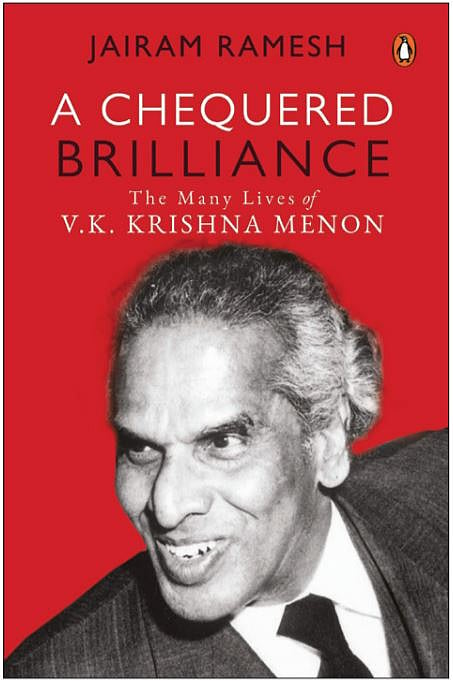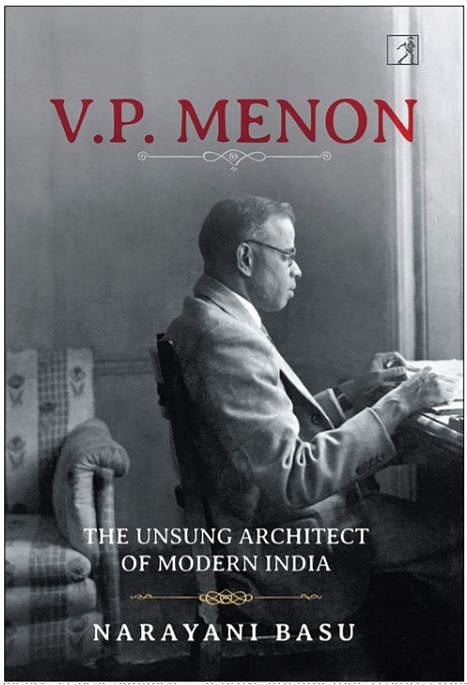Menon & Menon: A tale of two Menons and two books by Jairam Ramesh and Narayani Basu
Though Krishna Menon is still remembered, despite his controversial innings as the country’s Defence Minister, VP Menon is hardly known today except by some retired civil servants

Though both the Menons possessed a brilliant mind and a sharp intellect, there was very little else that was common between them. Though Krishna Menon, the extrovert and articulate politician, is still remembered, despite his controversial innings as the country's Defence Minister, VP Menon is hardly known today except amongst the higher echelons of retired civil servants.
No wonder in the foreword to her book Basu admits: ' V.K.Krishna Menon was, obviously, a far more compelling man.He strode into the political limelight as though he was born to it...V.P.Menon, on the other hand, merits a furrowed brow and a blank expression...and, yet, his importance to the Government of India, at a time when India stood on the verge of independence, remains unparalleled. '
Like VP's historic role on the eve of independence, virtually nothing is known of Krishna Menon's contribution to the freedom movement in the crucial period before independence. But the book by Jairam throws new light which must be read to understand the totality of a great personality and his unknown contribution to the cause of freedom struggle.
Krishna Menon spent 23 years in London agitating and making the case for India's freedom with political parties and parliamentarians, trade unions, universities, the media,literary and cultural personalities and all sorts of civic organizations across the UK.

Menon travelled widely across UK and organized numerous meetings 'to highlight the oppressive policies of the British administration in India.' This generated tremendous sympathy for India's independence amongst the people who had lived under the illusion that the Sun never sets on the British empire.
VK Menon became secretary of the India League founded in London by Bertrand Russell in 1932. Earlier, he had run its predecessor organization,Commonwealth of India League,which wound up within a few months after successfully organizing the visit of Mahatma Gandhi for the second Round Table Conference in 1931. He also started two fortnightly papers, The India Review and India News, to highlight ' Indian Life, Literature, Politics and Affairs'. The former, an official organ of the Indian League, became popular with the intelligentsia and contributed substantially in moulding the opinion of British elite in favour of India.
What Krishna Menon achieved in London during the nearly 20 years before independence is best summed up by Kamaladevi Chattopadhyay, a prominent socialist leader of freedom movement: "The India League which he headed, and ran from the late Twenties, was more than a mini Indian Embassy, for the prestige it enjoyed and the confidence it won.It kept India before the British with clarity, force, and insistence reflecting Krishna Menon's sincere devotion to the cause of India's freedom. His fearless advocacy often carried the day for India."
It was Jawaharlal Nehru's visit to London in 1935 when Krishna Menon met him for the first time that was to dramatically change the latter's career and fortunes. Coming in contact with the future Prime Minister,who had already earned world renown and shared his ideology, opened greener pastures for Menon both in London and Delhi in the years to come.
Coming back to the lesser known Menon, whose grandniece makes a brave attempt that 'restores him to his place in history' in her extremely well researched biography, 'VP' was Reforms Commissioner to India's last three Viceroys - Linlithgow, Wavell and Mountbatten and, after independence, as secretary, States' Ministry, was the right hand man of Sardar Patel, the country's first Home Minister and Deputy Prime Minister.
As Reforms Commissioner Menon was the Constitutional Advisor to the Viceroys and as the Secretary of States Ministry which he assumed on 5 July 1947 in the interim government, he was virtually the most powerful bureaucrat dealing with both the transfer of power and integration of princely states.
Not only was the Instrument of Accession drafted by Menon, he was the man behind Sardar Patel who pressurised and prevailed upon over 540 princes to accede to India .The most prized Instrument of Accession of Jammu and Kashmir was brought to Delhi by Menon himself after he had, on behalf of the government, convinced Maharaja Hari Singh to sign it on 26 Oct 1947.
This is corroborated by a telegram sent by Pt Nehru to the Maharaja: "VP Menon returned from Jammu this evening and informed me of the talks there. He gave me the Instrument of Accession and the Standstill Agreement you had signed."

Menon played a similar stellar role in assisting Sardar Patel in Hyderabad and Junagadh, the other two intractable states. Bemoans Basu: "Today, the integration of India is credited solely to Sardar Patel with VP Menon staying largely in the wings... It was VP Menon who cajoled, coaxed and threatened rulers into joining the new born Indian Union." But it is the politician as the team leader, and not the bureaucrat, however brilliant, who got all the credit.
However, it was the Mountbatten plan for India's independence that VP Menon produced after the last Viceroy's initial plan was rejected by Jawaharlal Nehru is, arguably, his least well-known contribution to independent India.
The Plan Balkan, which Mountbatten had already sent to London for approval, was shown by Mountbatten to Nehru at Simla on the night of 10 May 1947.The moment he saw the plan, Nehru flew into a rage for what he read horrified him. According to the Plan, India would be partitioned not into two nations, but 'vivisected into dozens of countries; each province would have the right to secede; each Princely State the right to become independent.'
After receiving an angry missive from Nehru early in the morning of 11 May, Mountbatten summoned VP who in the presence of Nehru, was asked by the Viceroy to submit the draft of a new plan that would meet the objections of Nehru ( and obviously of Patel in Delhi). As Nehru was to leave Simla by 7 pm, Menon had only four hours to devise his 'alternative, coherent and workable plan'.He met the deadline and presented a draft which would become the famous Mountbatten Plan.
By a strange coincidence both the Menons were present in Simla to assist the two powerful men, who were giving final shape not only to the destiny of a new India three months later, but also the future of Commonwealth.
No wonder Narayani writes: "Later, VP would acknowledge that without Jawaharlal's vision, India would have taken far longer to stand on her own when she finally freed herself from colonialism." The other Menon could not have agreed more.
(The writer, an ex-Army officer, is a former Secretary AICC and political analyst)
Follow us on: Facebook, Twitter, Google News, Instagram
Join our official telegram channel (@nationalherald) and stay updated with the latest headlines
